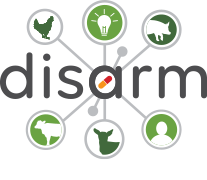5 Enriched Housing Reduces Disease Susceptibility to Co-infection with Porcine Reproductive and Respiratory Virus (PRRSV) and Actinobacillus pleuropneumoniae (Research paper; Van Dixhoorn, 2016)
5 Research paper
Enriched Housing Reduces Disease Susceptibility to Co-Infection with Porcine Reproductive and Respiratory Virus (PRRSV) and Actinobacillus pleuropneumoniae (A. pleuropneumoniae) in Young Pigs by van Dixhoorn, I.D.E., Reimert, I., Middelkoop, J., Bolhuis, E.J., Wisselink, H.J., Groot Koerkamp, P.W.G., Kemp, B., and N. Stockhofe-Zurwieden, 2016 PLOS ONE 11: 24p.
in Significant Impact Group(s): Housing and welfare \ Enrichment
Species targeted: Pigs;
Age: Young;
Outcome Parameter(s): Lower disease susceptibility to PRRSV and A. pleuropneumoniae; Improved welfare
Summary: Stress can reduce the ability of the immune system to fight disease, increasing an animal’s susceptibility to infection. Interventions that reduce stress may have positive effects on an animal’s immune system. This study investigated the effect of social and environmental enrichment on the impact of disease in pigs that were infected with PRRS virus and A. pleuropneumoniae bacteria. They compared groups of pigs housed in enriched pens to groups housed in barren pens. Enriched housed (EH) pigs showed faster clearance of the virus in blood and had less lung damage from infection – barren housed (BH) pigs had more lung lesions and tissue damage than EH pigs. EH pigs showed less stress-related
behaviour and differed immunologically and clinically from BH pigs. The research concluded that enriched housing reduces disease susceptibility to PRRSV and A. pleuropneumoniae in pigs. Enrichment positively influences behaviour, immune response and clinical outcomes in pigs. Until today, antimicrobial drugs have been the therapy of choice to combat bacterial diseases. Resistance against antibiotics is of growing concern in man and animals. Stress, caused by demanding environmental conditions, can reduce immune protection in the host, influencing the onset and outcome of infectious diseases. Therefore psychoneuro-immunological intervention may prove to be a successful
approach to diminish the impact of diseases and antibiotics use. This study was designed to investigate the effect of social and environmental enrichment on the impact
of disease, referred to as “disease susceptibility”, in pigs using a co-infection model of PRRSV and A. pleuropneumoniae. Twenty-eight pigs were raised in four pens under barren conditions and twenty-eight other pigs were raised in four pens under enriched conditions. In the enriched pens a combination of established social and environmental enrichment factors were introduced. Two pens of the barren (BH) and two pens of the enriched housed (EH) pigs were infected with PRRSV followed by A. pleuropneumoniae, the other two pens in each housing treatment served as control groups. We tested if differences in disease susceptibility in terms of pathological and clinical outcome were related to the
different housing regimes and if this was reflected in differences in behavioural and immunological states of the animals. Enriched housed pigs showed a faster clearance of viral PRRSV RNA in blood serum (p = 0.014) and histologically 2.8 fold less interstitial pneumonia signs in the lungs (p = 0.014). More barren housed than enriched housed pigs developed lesions in the lungs (OR = 19.2, p = 0.048) and the lesions in the barren housed pigs showed a higher total pathologic tissue damage score (p<0.001) than those in
enriched housed pigs. EH pigs showed less stress-related behaviour and differed immunologically and clinically from BH pigs. We conclude that enriched housing management reduces disease susceptibility to co-infection of PRRSV and A. pleuropneumoniae in pigs. Enrichment positively influences behavioural state, immunological response and clinical outcome in pigs. In our study, the enrichment stimulated the EH pigs psychologically differently as compared to the barren housed pigs and diminished (chronic) stress in the animals. Chronic stress in general is considered a potential influencing factor on disease susceptibility, however the complex pathways that mediate the effects of stress on infectious diseases, are not completely understood [1]. The better psycho-physiological and immunological state of the EH pigs likely positively affected their immune and inflammatory responses [67–71], and in this way, diminished the clinical manifestation. Our results are also in line with the increasing epidemiological evidence in humans and other species that environmentally induced adaptations, occurring at crucial stages of life, can potentially change behaviour, disease susceptibility and survival also known as the ‘early origins of
the adult disease susceptibility’ hypothesis [4, 72]. In conclusion, enriched rearing leads to a less severe onset and outcome of a PRRSV A. pleuropneumoniae co-infection. The enriched housed pigs showed a remarkably reduced impact of infection and were less prone to develop clinical signs of disease. We found more support for implementation of
psychoneuro-immunological intervention strategies to reduce the impact of infectious diseases and by this reducing antibiotics use. Future research should investigate the possible involved explanatory pathophysiological pathways.
5 Research paper – van Dixhoorn – 2016 – Enriched Housing Reduces Disease Susceptibility to Co-Infection with Porcine Repro
Where to find the original material:
https://www.ncbi.nlm.nih.gov/pmc/articles/PMC5015855/;
https://doi.org/10.1371/journal.pone.0161832
Country: NL
